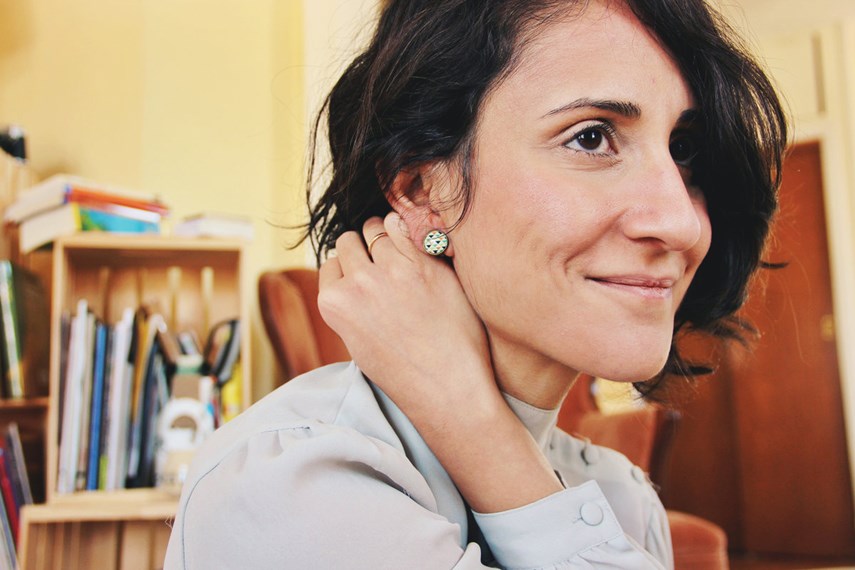Tabestoon Festival of Contemporary Iranian Arts and Music, Aug. 24-26 in Calgary, Vancouver and North Vancouver. For full schedule visit tabestoonfest.ca.
The women’s intoxicating voices embrace their audience on the internet.
In this instalment of NPR’s popular Tiny Desk concert series, Aida Shahghasemi and Markéta Irglová immerse themselves in the traditional Persian love song “Dokhtar Goochani” and gently move with the music. The poetic message, written in Farsi, is carried by their sweetly blended voices to the soul of the listener:
“Her eyebrows, her lips, her face, the girl from Ghoochan, Her hair has a scent like sweetbay magnolias, the girl from Ghoochan
Flowers are in bloom and she scatters flower petal all over, that girl from Ghoochan.”
Cradling a traditional Persian frame drum, Shahghasemi crafts intensity for an interlude. At first it sounds like the early rumble of an approaching storm, then crescendos into a force before tapering off into a lullaby.
Both women’s voices stand strong on their own for an a cappella ending to this performance filmed at NPR’s headquarters in Washington, D.C. Had this been Shahghasemi’s home country of Iran, that harmony would have been stamped out.
“Female vocalists of any genre are banned from having public performances except for female-only audiences,” explains Shahghasemi regarding laws that came in after the Islamic Revolution in 1979. “There is another exception and that is if there is an ensemble or choir and the voices cannot be easily identified.”
Shahghasemi sang freely after she moved from Tehran to Minneapolis in the summer of 2000. Her passion for Persian classical music stems from the cultural identity she craved after immigrating to the U.S., and the academic research Shahghasemi did around restrictions of female classical vocalists in Iran.
Leaving Iran at the age of 13, Shahghasemi was too young to have experienced the movement that drove female vocalists underground, but the stories from home made their way to her in Minneapolis.
“I knew of friends’ siblings that would go to shows outside the city or in private spaces,” says Shahghasemi.
While living in New York, Shahghasemi developed a stronger voice. She created and taught a class on Iranian art and society, called Iran’s Arts Activism, at New York University. Shahghasemi has also lent her musical talents to non-profit organizations and used her art as a vehicle for social justice, saying her main interest lies at the intersection of humanitarian and creative work.
“I think (art) has the potential to be extremely effective and it is different from one artistic style to another,” explains Shahghasemi. “There are changes that shape slowly over time, such as Ella Fitzgerald dominating bebop and eventually becoming a role model for many, despite her activity during a time of segregation.”
Shahghasemi describes how she met Czech singer Irglová, her future collaborator, by chance in a Brooklyn cafe.
“She happened to be playing with a friend there and was also on the lookout for a percussionist,” recalls Shahghasemi. “I fit the bill since I was mostly playing percussion at the time and singing on the side. We clicked immediately. It was simply lovely to work with her. Smooth, natural, abundant with love and energy ... kind. I always wish for more.”
Irglová co-wrote the lyrics and music to the romantic musical Once. From that score, the song “Falling Slowly” won an Academy Award for Best Original Song.
For her debut album, Irglová asked Shahghasemi to record “Dokhtar Goochani” with her. In that NPR performance, Irglova said Shahghasemi has been inspirational to her in bringing forth Iranian culture.
Meanwhile, Shahghasemi’s debut album, Wind Between the Horse's Ears, is an accumulation of her works over the years. Some tracks feature original music and lyrics, while others borrow words from Iranian poets.
Shahghasemi will bring a musical tribute from her homeland during Tabestoon Festival on Aug. 26 where she will be performing a free show on a floating stage in the Shipyards’ district.
She promises a minimalist, intimate performance. For some songs she will be accompanied by a thumb piano or a traditional keyboard. Shahghasemi will also allow her voice to shine on its own.
During the festival at the Shipyards there will be a full day of free entertainment on multiple stages, a Tabestoon Bazaar, Artists’ Alley, and food, including Persian cuisine. In the evening there will be ticketed events on the pier.
Tabestoon, meaning summer in Farsi, is billed as a “vibrant and diverse multi-platform artistic festival devoted to fostering the rich creative tastes of the new generation of Iranian youth in North American diaspora communities.”
Musical headliners for the festival include Kiosk, a pioneering Iranian rock band founded by Arash Sobhani in Tehran in 2003 and now based in San Francisco.
Kiosk is known for its satirical lyrics, which provide a socio-political commentary of life in Iran, as well as its blend of several music styles, from Iranian folk to gypsy jazz to rock.
Also joining the festival lineup is Abjeez, a band of sisters based in Stockholm and the first to produce Persian reggae and ska music.



